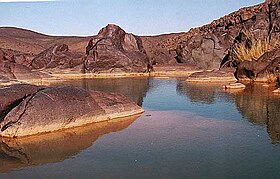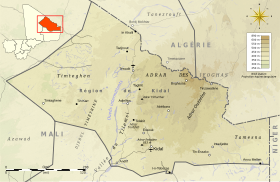Adrar des Iforas
| Adrar des Ifoghas | |
|---|---|
| Adrar n Ifoghas | |

View of a guelta near Oubankort
|
|
| Highest point | |
| Elevation | 890 m (2,920 ft) |
| Geography | |
| Location | Central Sahara |
| Countries | Mali and Algeria |
| States/Provinces | Kidal Region, Tamanrasset and Adrar |
The Adrar des Ifoghas (also Adrar des Iforas; Tamasheq: ⴰⴷⵔⴰⵔ ⵏ ⵉⴼⵓⵖⴰⵙ in Tifinagh; Adrar n Ifoghas; Arabic: أدرار إيفوغاس Ifoghas' Mountain) is a massif in located in the Kidal Region of Mali, reaching into Algeria. It has an area of around 250,000 square kilometers (97,000 square miles).
The Adrar des Ifoghas area is characterized by wide, shallow valleys, and is strewn with piles of eroded granite blocks. The massif's valleys open to the Tamesna plain on the east, to the Telemsi fosse on the west, to the western basin of the Azaouak valley on the south, and to the Tanezrouft on the north. Settlements of the area include Kidal, Aguel'hoc, Boghassa, Essouk, and Tessalit.
The Adrar des Ifoghas is known locally as "Adagh". "Adrar" is the Berber word for mountain, while "Ifogha" is the name of an aristocratic Tuareg clan, "Kel Ifoghas", who have dominated the region for generations. Like most Tuareg, the Kel Ifoghas are nomadic, raising camels, goats, and sheep for sustenance and for sale.
The area is rich in archaeological remains, particularly rock drawings which depict men hunting, farming, and cattle-rearing. The skeleton of Asselar man (c. 6,400 BP) was also found in the area by Wladimir Besnard and Théodore Monod. The Adrar des Ifoghas has also become popular for treks.
...
Wikipedia

